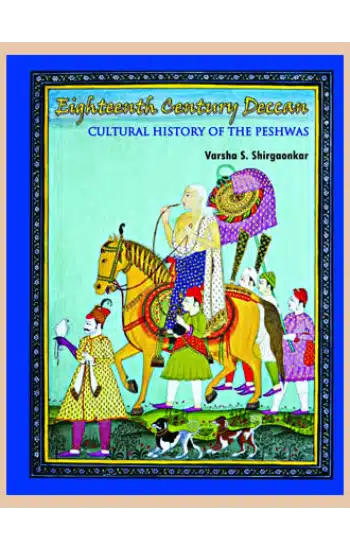
Save: 15%

Save: 15%
Eighteenth Century Deccan: Cultural History Of The Peshwas
Publisher:
| Author:
| Language:
| Format:
Publisher:
Author:
Language:
Format:
₹2,500 ₹2,125
Save: 15%
In stock
Ships within:
In stock
| Book Type |
|---|
ISBN:
Page Extent:
Presently, one of the prominent debates in Indian History remains the eighteenth century period that revolves around the relationship between political stability and culture. Eighteenth century marked a significant stage in the Maratha history since in this century the Maratha rule expanded in North India and Karnataka. This century also witnessed an important position granted to the post of the Peshwa, as seen from the sanad of Maratha king Chhatrapati Shahu in the name of Peshwa, bestowing upon him total administrative authority. The political connections with the new provinces outside Maharashtra brought with them the streams of a new culture to the Deccan. Historical records reflect upon the intention of the Peshwas and their sardars to create the prototype especially of the culture of North India. Various dimensions of new culture such as Persian language, luxurious items, music and dance entered the Deccan and blended with its prevalent cultural characteristics. The eighteenth century, towards its close, also witnessed the entry of European culture into the Deccan. The book shows how cultural dynamism was operative in the eighteenth century Deccan with special reference to the Peshwa period. The downfall of Maratha Empire took place in 1818 and hence the discussion in the book goes beyond the eighteenth century. In conclusion, the book takes a stand that culture thrives in spite of political instability and that it migrates in search of patronage. When culture settles in the new patron house, its blend with the local trend is inevitable and thus the process paves the way for a composite culture. The book will interest researchers of the cultural history of India.
Presently, one of the prominent debates in Indian History remains the eighteenth century period that revolves around the relationship between political stability and culture. Eighteenth century marked a significant stage in the Maratha history since in this century the Maratha rule expanded in North India and Karnataka. This century also witnessed an important position granted to the post of the Peshwa, as seen from the sanad of Maratha king Chhatrapati Shahu in the name of Peshwa, bestowing upon him total administrative authority. The political connections with the new provinces outside Maharashtra brought with them the streams of a new culture to the Deccan. Historical records reflect upon the intention of the Peshwas and their sardars to create the prototype especially of the culture of North India. Various dimensions of new culture such as Persian language, luxurious items, music and dance entered the Deccan and blended with its prevalent cultural characteristics. The eighteenth century, towards its close, also witnessed the entry of European culture into the Deccan. The book shows how cultural dynamism was operative in the eighteenth century Deccan with special reference to the Peshwa period. The downfall of Maratha Empire took place in 1818 and hence the discussion in the book goes beyond the eighteenth century. In conclusion, the book takes a stand that culture thrives in spite of political instability and that it migrates in search of patronage. When culture settles in the new patron house, its blend with the local trend is inevitable and thus the process paves the way for a composite culture. The book will interest researchers of the cultural history of India.
About Author
Reviews
There are no reviews yet.
Related products
Burhanpur: Unexplored History, Monuments And Society
Save: 15%
Harappan Studies: Recent Researches In South Asian Archaeology (Vol. Ii)
Save: 15%
RELATED PRODUCTS
Harappan Studies: Recent Researches In South Asian Archaeology (Vol. Ii)
Save: 15%
India, Central Asia And Russia: Three Millennia Of Contacts
Save: 15%
Maritime Trade And Overseas Activities Of Early India: Odishan Perspective
Save: 15%
Rockcut Temples Of South India: Architectural Dimensions
Save: 15%
Royal Messages By The Wayside: Historical Geography Of The Asokan Edicts
Save: 15%
The Dussehra Of Kulu: History And Analysis Of A Cultural Phenomenon
Save: 15%
The Sacred Landscape Of Mundeshwari: The ‘Oldest Living’ Temple
Save: 15%
The Silk Road: Trade, Caravan Serais, Cultural Exchanges And Power Games
Save: 15%
Women And Gender In Ancient Inida: A Study Of Texts And Inscriptions
Save: 15%



Reviews
There are no reviews yet.